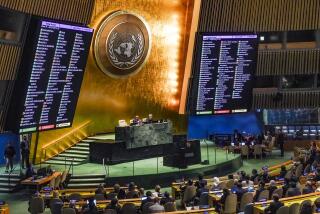U.N. Moves to Ease Yugoslavia Sanctions : Balkans: Travel and sports curbs would be halted if monitors confirm border has been closed to arms for Bosnian Serbs. Embargo remains in force.
- Share via
WASHINGTON — In a mood to show steel and gentleness at the same time, the U.N. Security Council passed a pair of resolutions Friday night to punish the Serbs of Bosnia while taking the controversial step of rewarding the Serbs of today’s rump Yugoslavia.
The council, by an 11-2 vote, with two abstentions, approved a resolution setting up a procedure to ease sanctions against Serbia and Montenegro--all that is left of what was once the Yugoslav republic.
The vote amounted to a concrete show of gratitude to Serbian President Slobodan Milosevic for announcing a halt in supplies of arms and other goods from Yugoslavia to the Serbs fighting a civil war in neighboring Bosnia-Herzegovina and for allowing the United Nations to station monitors on the border between Serbia and Bosnia.
Haris Silajdzic, prime minister of beleaguered Bosnia, denounced the resolution as a premature reward for subterfuge. Despite public claims to the contrary, he said, Yugoslavia is still providing supplies to the Bosnian Serbs.
Ten ambassadors from Islamic states addressed the council and scolded its members for rewarding Milosevic while ignoring the victims of the civil war.
Pakistan and Djibouti, both Muslim countries, voted against the resolution. Nigeria and Rwanda abstained.
Under the resolution, a few sanctions would be lifted for 100 days as soon as U.N. Secretary General Boutros Boutros-Ghali confirms from U.N. monitors that Yugoslavia really has closed down its border to arms shipments.
With these sanctions out of the way, Serbia and Montenegro would be allowed commercial air flights from abroad, ferry service to Italy and the right to take part in international sports and cultural programs. The main economic embargo against trade with Serbia and Montenegro, however, would remain in place.
The council’s second resolution, passed by a 14-0 vote, with China abstaining, condemns the Bosnian Serbs for their recent refusal to approve a peace pact that would have forced them to withdraw from large areas of the territory they have seized in Bosnia.
As punishment, the council ordered a halt to all trade with the Bosnian Serbs, a blockage of payment of dividends to them, a freezing of their assets in other countries, a ban on boats trying to reach Bosnian Serb-controlled towns by river and a prohibition against any Bosnian Serb official or prominent supporter entering another country.
The Security Council also passed a third resolution--by a vote of 15 to 0--calling on the Bosnian Serbs to halt their ethnic attacks on Muslims and allow U.N. and Red Cross official complete access to Banja Luka, Bijeljina and other towns under Bosnian Serb control.
In a luncheon with a few reporters, Bosnian Prime Minister Silajdzic argued that Yugoslavia had done nothing to deserve any easing of international sanctions. He rejected Milosevic’s claim that Serbia has stopped the flow of arms and other goods to the Bosnian Serbs.
Silajdzic said his government stands by its acceptance of the peace proposal even though it considers the plan, which would give about 49% of Bosnia to the Serbs, to be unjust. The plan was emphatically rejected by the Serbs, who now control 70% of Bosnia.
Times staff writer Norman Kempster also contributed to this report.
More to Read
Sign up for Essential California
The most important California stories and recommendations in your inbox every morning.
You may occasionally receive promotional content from the Los Angeles Times.













